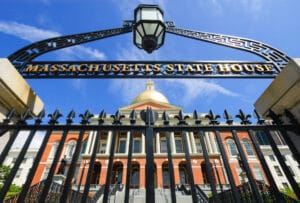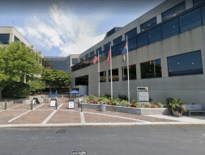Michelle Wu became the third Boston mayor in a row to ask Beacon Hill for permission to put a 2 percent tax on multi-million-dollar real estate sales to boost affordable housing earlier this week.
And she was the third mayor in a row to hear leaders of real estate industry trade groups blast the idea before a panel of state legislators.
Wu and her top housing and elder affairs deputies and members of the Greater Boston Real Estate Board and Massachusetts Association of Realtors made their competing cases to the state legislature’s Joint Committee on Revenue on Tuesday afternoon.
Boston City Councilors approved a home rule petition in March that twinned senior property tax relief with a sales tax on real estate sales and “a controlling interest in a trust, limited liability company, or other entity that directly or indirectly holds an interest in any real property situated in the city of Boston,” the bill’s (H.4637) text reads.
The first $2 million of a property’s sale price or the controlling interest transfer would be exempt from the tax. The city would be able to adjust the tax amount up or down every three years, with 2 percent being the maximum.
The proceeds would be deposited in the city’s Neighborhood Housing Trust Fund, which is managed by an independent board and finances housing developments with twice-yearly grant cycles. A majority of states and Washington, D.C. have some form of local-option real estate sales tax, and other Massachusetts committees have petitioned for similar measures.
“This is not about increasing up-front costs. This is not about adding to the burden as developers are looking to cobble together the permitting costs and get through the process. This is about adding a small fee at point of sale, when the resources are there,” Wu told legislators. “We can have an immediate and tangible impact that can help stem and slow displacement.”
Wu and other Boston officials argue the tax – which the city estimates could generate up to $100 million per year on around 700 sales based on 2021’s real estate market – is vital to raise more money on an ongoing basis to help close financing gaps for affordable housing projects and first-time homebuyer assistance programs. As an example of the potential impact, Wu cited a recent $40 million Neighborhood Housing Trust Fund grant round that financed projects totaling 700 housing units.
City Councilor Kenzie Bok, who represents neighborhoods from Beacon Hill to Mission Hill, said the tax was also important to “harness Boston’s growth for all Bostonians.”
“If we do not achieve further harnessing mechanisms we will see further inequalities,” she said.
But GBREB’s top real estate lobbyist Patricia Baumer argued real estate sales are volatile and the city already has tools at its disposal to raise significant funding for affordable housing. The city only levies a 1 percent property tax surcharge under the Community Preservation Act, instead of the maximum 3 percent allowed by the law, she said, and pointed out that transfer taxes can’t be paid for out of a mortgage. The city currently collects over $20 million annually through the CPA.
“We don’t disagree with the mayor on the need for affordable housing. The fact is development costs and local regulations are making it difficult everywhere to build,” she said. “[According to the National Apartment Association] Boston ranks only second behind Honolulu, Hawaii – an island – in terms of the difficulty for building housing.”
GBREB treasurer Mike Edward, president of commercial real estate consultancy Perry CRE, also pointed out that nearly all multifamily sales in the city, even those owned by small landlords, would be hit with the tax, as well.
The Joint Committee on Revenue must give its sign-off to the home rule petition before the larger legislature can vote on it. The legislature’s current session ends July 31.







